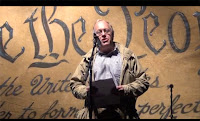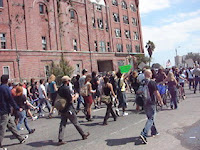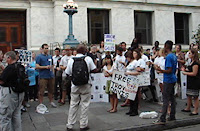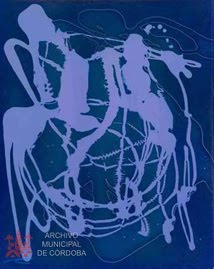What too few of the activists who have been protesting against BP during the past year and a half have realized is that it doesn't matter how much they complain about the destruction of the Gulf ecosystem and the human illness caused by the oil and chemical dispersants. BP doesn't care. It will stonewall as long as possible, and will pay as little damages as possible. Our federal and state governments don't care either, because the executive, legislative, and judicial branches have been almost thoroughly captured by corporate interests, of which BP is a major player.
Every decision BP made, even before the Deepwater Horizon exploded in April 2010, was based on cost-benefit analysis. As the marine biologist Chris Pincetich, whose professor was on the advisory panel BP and the Coast Guard on the use of dispersants in the Gulf, including on its shores, said last summer that the decisions on the use of these toxic chemical dispersants, which exacerbated the ecocide of the Gulf, were based entirely on cost-benefit analysis, and not at all on the damage to the environment and on its effect on wildlife and human health. BP shareholders demand profit, no matter how much death and destruction necessary to accomplish maximum profits. BP's actions, and inaction, over the past year and a half reflect the worst of human nature, and are the result of decades of administrations and congresses controlled by both major parties who are in fact controlled by the campaign contributors and lobbyists who shower them with cash and other bribes.
On the other hand, there are many environmental and social justice activists involved in responding to the BP and government oil and chemical dispersant catastrophe in the Gulf of Mexico and the region who recognized from the beginning that it's our corrupt political and predatory economic system that has enabled this ecocide and that has allowed those responsible for its perpetration and perpetuation to remain free from criminal charges, free to resist restoring the environment and compensating the injured for decades to come. These environmental and social justice activists have joined the Occupation Together movement taking place New York, Washington D.C., Philadelphia, Los Angeles, and throughout the Gulf Coast states, from Florida to Texas. They can be found organizing and participating in the occupation of their town's public spaces, because they know that, as Chris Hedges said when he announced that he would be in Washington D.C. with the Stop The Machine occupation of that city, that "civil disobedience is the only weapon we have left to save not only the ecosystem that sustains life, but the nation itself." They know, better than many in this country, that Barack Obama failed the people on the Gulf Coast in providing them relief and that he is, as Ralph Nader pointed out during his the 2008 presidential campaign, that he was nothing more than a corporatist, and that all branches of the federal and state government—executive, legislative, and judicial—have been captured by corporate interests. The EPA, under Administrator Lisa Jackson, allowed BP to apply unprecedented amounts of chemical dispersants to the Gulf waters and shores so that BP could hide the oil so it could keep its monetary penalties to a minimum, and thus protect its shareholder profits.
Anyone who has been a victim of the BP oil disaster or has worked to mitigate that disaster during the past year and a half, have witnessed no better example of how a corporation and the state have merged to serve the corporation to the peril of the public, whom the government is supposed to serve. People who live on the coast have been witnessing and experiencing the "system of death" that BP merged with the state continues to be. They also know that their shouts for justice have been carried off by the Gulf breezes, drowned out by the poisoned surf, and ignored by the corporate media, which has blithely dismissed reports of human illness from the oil and dispersants as nothing more than anecdotal evidence.
Everyone in the Gulf region should be participating in our town occupation, or organizing one if it is not yet taking place; everyone should be joining his or her voice with the occupiers to demand change; everyone should participate in an alternative, sustainable community being developed now in towns throughout the U.S., everyone should prepare to participate in the civil disobedience necessary to force the changes that must occur if we, our children, and our children's children are to have a life worth living. Chris Hedges explained in the video below why he would be in Washington D.C. on October 6:
"We are the last thin line of defense between the disintegration of our country, between corporate forces, which in theological terms are systems of death, who will snuff out any possibility of a livable and sustainable future for our children. It is only by standing up, using our bodies in acts of civil disobedience, that we have any hope of thwarting the freight train of destruction that is now barreling towards us, driven by the engine of corporatism."
Chris Hedges has described better than anyone why we should all be involved in the occupations, and why it is urgent that we do. Please watch this video, and that of his address to the crowd in D.C. on October 6, read the transcripts, and forward them to your family and friends. Get inspired, and get involved. His reasons should be—they must be—all of our reasons.
My name is Chris Hedges, and I'm going to Washington, D.C., on October 6, 2011, because civil disobedience is the only weapon we have left to save not only the ecosystem that sustains life, but the nation itself. Corporate forces--unregulated, unfettered, corporate forces--exploit everything--human beings,. the natural world--until exhaustion, or collapse
Karl Marx was right: unregulated, unfettered capitalism is a revolutionary force. And it is the radicals who have seized control, and know no limits.The only word corporations know is more. And they have seized all of the formal, traditional mechanisms of power: the legislative branch, the judicial branch, the executive branch, as well as the attendant institutions that once made participatory democracy possible: including the press; including a destruction of labor; a diminishing and degradation of a public education system that once made it possible for citizens to discern and articulate their own interests. It is imperative that all of us now stand up, because we have very little time left. The ecosystem itself is being ravaged at a rate that was not even predicted a few years ago by the best climate scientists.
We don't have much time left. The internal reconfiguration of the United States into a form of neo-feudalism, a world of masters and serfs, a world where two-thirds of the country will live at a level of subsistence, where they will struggle to provide enough food for their families to eat, is the inevitable result of the corporate state and globalization. It is imperative upon all of us to begin to realize that the institutions that we once trusted, including the Democratic Party, to watch out for our interests have become nothing more than puppets, appendages of the corporate state.
We are the last thin line of defense between the disintegration of our country, between corporate forces, which in theological terms are systems of death, who will snuff out any possibility of a livable and sustainable future for our children. It is only by standing up, using our bodies in acts of civil disobedience, that we have any hope of thwarting the freight train of destruction that is now barreling towards us, driven by the engine of corporatism.
And so, I call upon all of you, please, it's not about us anymore, it's about our kid's, it's about our kid's kids, it's about our failure to stand up and protect the earth and protect the nation from forces that will inevitably, if we do not stop them, make life for millions and millions of people a nightmare.
Every decision BP made, even before the Deepwater Horizon exploded in April 2010, was based on cost-benefit analysis. As the marine biologist Chris Pincetich, whose professor was on the advisory panel BP and the Coast Guard on the use of dispersants in the Gulf, including on its shores, said last summer that the decisions on the use of these toxic chemical dispersants, which exacerbated the ecocide of the Gulf, were based entirely on cost-benefit analysis, and not at all on the damage to the environment and on its effect on wildlife and human health. BP shareholders demand profit, no matter how much death and destruction necessary to accomplish maximum profits. BP's actions, and inaction, over the past year and a half reflect the worst of human nature, and are the result of decades of administrations and congresses controlled by both major parties who are in fact controlled by the campaign contributors and lobbyists who shower them with cash and other bribes.
On the other hand, there are many environmental and social justice activists involved in responding to the BP and government oil and chemical dispersant catastrophe in the Gulf of Mexico and the region who recognized from the beginning that it's our corrupt political and predatory economic system that has enabled this ecocide and that has allowed those responsible for its perpetration and perpetuation to remain free from criminal charges, free to resist restoring the environment and compensating the injured for decades to come. These environmental and social justice activists have joined the Occupation Together movement taking place New York, Washington D.C., Philadelphia, Los Angeles, and throughout the Gulf Coast states, from Florida to Texas. They can be found organizing and participating in the occupation of their town's public spaces, because they know that, as Chris Hedges said when he announced that he would be in Washington D.C. with the Stop The Machine occupation of that city, that "civil disobedience is the only weapon we have left to save not only the ecosystem that sustains life, but the nation itself." They know, better than many in this country, that Barack Obama failed the people on the Gulf Coast in providing them relief and that he is, as Ralph Nader pointed out during his the 2008 presidential campaign, that he was nothing more than a corporatist, and that all branches of the federal and state government—executive, legislative, and judicial—have been captured by corporate interests. The EPA, under Administrator Lisa Jackson, allowed BP to apply unprecedented amounts of chemical dispersants to the Gulf waters and shores so that BP could hide the oil so it could keep its monetary penalties to a minimum, and thus protect its shareholder profits.
Anyone who has been a victim of the BP oil disaster or has worked to mitigate that disaster during the past year and a half, have witnessed no better example of how a corporation and the state have merged to serve the corporation to the peril of the public, whom the government is supposed to serve. People who live on the coast have been witnessing and experiencing the "system of death" that BP merged with the state continues to be. They also know that their shouts for justice have been carried off by the Gulf breezes, drowned out by the poisoned surf, and ignored by the corporate media, which has blithely dismissed reports of human illness from the oil and dispersants as nothing more than anecdotal evidence.
Everyone in the Gulf region should be participating in our town occupation, or organizing one if it is not yet taking place; everyone should be joining his or her voice with the occupiers to demand change; everyone should participate in an alternative, sustainable community being developed now in towns throughout the U.S., everyone should prepare to participate in the civil disobedience necessary to force the changes that must occur if we, our children, and our children's children are to have a life worth living. Chris Hedges explained in the video below why he would be in Washington D.C. on October 6:
"We are the last thin line of defense between the disintegration of our country, between corporate forces, which in theological terms are systems of death, who will snuff out any possibility of a livable and sustainable future for our children. It is only by standing up, using our bodies in acts of civil disobedience, that we have any hope of thwarting the freight train of destruction that is now barreling towards us, driven by the engine of corporatism."
Chris Hedges has described better than anyone why we should all be involved in the occupations, and why it is urgent that we do. Please watch this video, and that of his address to the crowd in D.C. on October 6, read the transcripts, and forward them to your family and friends. Get inspired, and get involved. His reasons should be—they must be—all of our reasons.
[transcript]
My name is Chris Hedges, and I'm going to Washington, D.C., on October 6, 2011, because civil disobedience is the only weapon we have left to save not only the ecosystem that sustains life, but the nation itself. Corporate forces--unregulated, unfettered, corporate forces--exploit everything--human beings,. the natural world--until exhaustion, or collapse
Karl Marx was right: unregulated, unfettered capitalism is a revolutionary force. And it is the radicals who have seized control, and know no limits.The only word corporations know is more. And they have seized all of the formal, traditional mechanisms of power: the legislative branch, the judicial branch, the executive branch, as well as the attendant institutions that once made participatory democracy possible: including the press; including a destruction of labor; a diminishing and degradation of a public education system that once made it possible for citizens to discern and articulate their own interests. It is imperative that all of us now stand up, because we have very little time left. The ecosystem itself is being ravaged at a rate that was not even predicted a few years ago by the best climate scientists.
We don't have much time left. The internal reconfiguration of the United States into a form of neo-feudalism, a world of masters and serfs, a world where two-thirds of the country will live at a level of subsistence, where they will struggle to provide enough food for their families to eat, is the inevitable result of the corporate state and globalization. It is imperative upon all of us to begin to realize that the institutions that we once trusted, including the Democratic Party, to watch out for our interests have become nothing more than puppets, appendages of the corporate state.
We are the last thin line of defense between the disintegration of our country, between corporate forces, which in theological terms are systems of death, who will snuff out any possibility of a livable and sustainable future for our children. It is only by standing up, using our bodies in acts of civil disobedience, that we have any hope of thwarting the freight train of destruction that is now barreling towards us, driven by the engine of corporatism.
And so, I call upon all of you, please, it's not about us anymore, it's about our kid's, it's about our kid's kids, it's about our failure to stand up and protect the earth and protect the nation from forces that will inevitably, if we do not stop them, make life for millions and millions of people a nightmare.
[transcript]
There are no excuses left. Either you join the revolt taking place here tonight on Wall Street and in financial districts of other cities across the country, or you stand on the wrong side of history. Either you obstruct in the only form left to us, which is through civil disobedience, the plundering by the criminal class on Wall Street, an accelerated destruction of the ecosystem that sustains the human species, or you become a passive enabler of a monstrous evil. Either you taste, feel, and smell the intoxication of freedom and revolt, or sink into the miasma of despair and apathy. Either you are a rebel or a slave.
To be declared innocent in a country where the rule of law means nothing—where we have undergone a corporate coup; where the poor and working men and women are reduced to joblessness and hunger; where war, financial speculation, and internal surveillance are the only real business of the state; where even habeas corpus no longer exists, for you as a citizen are nothing more than a commodity to corporate systems of power, one to be used and discarded—is to be complicit in this radical evil. To stand on the sidelines and say, “I am innocent,” is to bear the mark of Cain; it is to do nothing to reach out to help the weak, the oppressed, and the suffering to save the planet. To be innocent in times like these is to be a criminal. Ask the environmental activist Tim Dechristopher, now in prison.
Choose; but choose fast! The state and the corporate forces are determined to crush this. They’re not going to wait for you. They are terrified this will spread, as it is spreading. They have their long phalanxes of police on motorcycles, their rows of white paddy wagons, their foot soldiers hunting for you on the streets with pepper spray and orange plastic nets. They have their metal barricades set up on every single street leading into the financial district in New York, where the Mandarins in Brooks Brothers suits use your money—money they stole from you—to gamble and speculate and gorge themselves, while one in four children outside those barricades depend on food stamps to eat.
Speculation in the seventeenth century was a crime; speculators were hanged. Today they run the state, and financial markets. They disseminate the lies that pollute our airwaves. They know, even better than you or I, how pervasive the corruption and theft has become, how gamed the system is against you, how corporations have cemented into place a thin oligarchic class, an obsequious cadré of politicians—including Barack Obama, judges, and journalists—who live in their little gated Versailles, while six million Americans are thrown out of their homes, a number soon to rise to 10 million; where a million people a year go bankrupt because they cannot pay their medical bills, and 45,000 die from lack of proper care; where real joblessness is spiraling to over 20%; where the citizenry, including students, spend lives toiling in debt peonage, working dead-end jobs, when they have a job, a world devoid of hope, a world of masters and serfs.
The only word these corporations know is more. They are disemboweling every last social service program funded by taxpayers—from education to social security—because they want that money for themselves.
Let the sick die; let the poor go hungry; let families be tossed into the street, let the unemployed rot, let children in the inner cities or rural wastelands learn nothing, and live in misery and fear; let students finish school with no jobs and no prospects of jobs; let the prison system, the largest in the industrialized world, expand to swallow up all potential dissenters; let torture continue; let teachers, police, fire fighters, postal employees, and social workers join the ranks of the unemployed; let our imperial wars in Iraq and Afghanistan, and our proxy wars in Yemen, Pakistan, and Somalia bankrupt the state and leave hundreds of thousands of innocents maimed and dead; let the roads, bridges, dams, levees, power grids, rail lines, subways, bus services, schools, and libraries crumble or close; let the rising temperatures of the planet, the freak weather patterns, the hurricanes, the droughts, the flooding, the tornadoes, the melting polar ice caps, the poisoned water systems, the polluted air increase until the species dies.
Let the sick die; let the poor go hungry; let families be tossed into the street, let the unemployed rot, let children in the inner cities or rural wastelands learn nothing, and live in misery and fear; let students finish school with no jobs and no prospects of jobs; let the prison system, the largest in the industrialized world, expand to swallow up all potential dissenters; let torture continue; let teachers, police, fire fighters, postal employees, and social workers join the ranks of the unemployed; let our imperial wars in Iraq and Afghanistan, and our proxy wars in Yemen, Pakistan, and Somalia bankrupt the state and leave hundreds of thousands of innocents maimed and dead; let the roads, bridges, dams, levees, power grids, rail lines, subways, bus services, schools, and libraries crumble or close; let the rising temperatures of the planet, the freak weather patterns, the hurricanes, the droughts, the flooding, the tornadoes, the melting polar ice caps, the poisoned water systems, the polluted air increase until the species dies.
Who the hell cares, if the stocks of Exxon-Mobil or the coal industry or Goldman Sachs are high? Life is good. “Profit, profit, profit”: this is what they chant behind those metal barricades in the financial district. They have their fangs deep into your necks. And if you do not shake them off very, very soon, they will kill you, and they will kill the ecosystem, dooming your children and your children’s children. And they are too stupid and too blind to see that they will perish with the rest of us.
So, either you rise up and supplant them, either you dismantle the corporate state for a world of sanity, a world where we no longer kneel before the absurd idea that the demands of financial markets should govern human behavior, or watch as we are frog-marched toward self-annihilation. Those on the streets around Wall Street and here tonight are the physical embodiment of hope.
You know that hope has a cost, that it is not easy or comfortable, that it requires self-sacrifice and discomfort, and finally faith. And those who hope sleep on cement every night, and their clothes are soiled, and they have eaten more bagels and peanut butter than they ever thought possible. And they have tasted fear, been beaten, gone to jail, been blinded by pepper spray, cried, hugged each other, laughed, sung, talked too long in General Assemblies, seen their chants drift upwards to the office towers above them, and wondered if it is worth it, if anyone cares, if they will win.
But as long as we remain steadfast, we can see our way out of the corporate labyrinth. This is what it means to be alive, and you tonight and those in New York Philadelphia Los Angeles Boston























